- Home
- Tim Willocks
Memo From Turner
Memo From Turner Read online
Contents
Cover
About the Book
About the Author
Also by Tim Willocks
Dedication
Title Page
Prologue: Tuesday Morning
Part One: Sunday
Thirstland
1
2
3
4
5
6
7
8
9
10
11
12
13
14
Part Two: Monday
All Manner of Madness
15
16
17
18
19
20
21
22
23
24
25
26
27
28
29
30
31
32
33
34
Part Three: Tuesday
Ride it Till it Crashes
35
36
37
38
39
40
41
42
43
44
45
46
47
Acknowledgement
Copyright
About the Book
What happens when a man of absolute integrity finds himself trapped in a world of absolute corruption?
During a weekend spree in Cape Town a young, rich Afrikaner fatally injures a teenage street girl with his Range Rover but is too drunk to know that he has hit her. His companions – who do know – leave the girl to die.
The driver’s mother, a self-made mining magnate called Margot Le Roux, intends to keep her son in ignorance of his crime. Why should his life be ruined for a nameless girl who was already terminally ill? No one will care and the law is cheap. But by chance the case falls to the relentless Warrant Officer Turner of Cape Town homicide.
When Turner travels to the remote mining town that Margot owns – including the local police and private security force – he finds her determined to protect her son at any cost. As the battle of wills escalates, and the moral contradictions multiply, Turner won’t be bought and won’t be bullied, and when they try to bury him he rediscovers, during a desperate odyssey to the very brink of death, a long-forgotten truth about himself …
By the time Willocks’s tale is finished, fourteen men have died. He shows once again that he is the laureate of the violent thriller.
About the Author
Tim Willocks is a novelist, screenwriter and producer. Translated into twenty languages, his novels include The Religion, Bad City Blues, Green River Rising and Twelve Children of Paris. He has worked with major Hollywood directors, dined at the White House and holds a black belt in Shotokan karate.
ALSO BY TIM WILLOCKS
Bad City Blues
Green River Rising
Bloodstained Kings
The Religion
Doglands
The Twelve Children of Paris
To my love and inspiration: Valentina
Prologue: Tuesday Morning
Langkopf, Northern Cape, South Africa
Turner’s vision felt gritty, sometimes blurred, his eyeballs too small for their sockets. His head ached with a dull beat interrupted by sudden shards whenever the tyres hit a bump. He could feel his brain move inside his skull, tugging against the blood vessels as if they were cheese wires. The pain seemed worse than before. The same was true for the rest of his body; his kidneys, his spine, his ankles. Maybe it was because he was recovering, his nerves reawakening to work out how much damage had been done. Maybe he’d drunk too much water; maybe not enough. He had water but he didn’t trust it. He couldn’t remember the science and he couldn’t risk an experiment. He had settled on the idea of eggs. He trusted eggs. If he didn’t get eggs he was afraid his brain would explode before someone put a bullet in it. The one thing he knew for sure was that someone was going to try.
He glanced at the speedometer. 140kph. He was going too fast for his blunted, depleted senses; much faster than it seemed, even on this run-down dead-end country road to nowhere. Easy enough in two tons of luxury technology with a five-litre supercharged Jaguar engine under the lid. The irony was not lost on him. If the engine had been less potent and the car less than huge, a lesser monument to its owner’s unslakable vanity, the event that had brought him here, to the back of beyond and beyond the bounds of his humanity, would never have occurred, and he wouldn’t be driving as if the future were something he didn’t expect to see.
The sun was behind him to the east. For the moment no one else was. Before he knew it the gate to the farm appeared just ahead and he stomped on the brake. The algorithms of the onboard computers raced to prevent catastrophe. The pain in his skull intensified. The red Range Rover slowed with contemptuous ease and Turner braced his hands against the steering wheel as his chest rammed against the seat belt.
The dead man in the passenger seat beside him wasn’t strapped in and lurched forward from the waist. His eyebrows bounced off the dashboard and his head flopped down towards his knees. Fresh rivulets of blood pumped from the bullet holes in his back to further stain the cream leather upholstery.
Turner was more familiar with corpses than most. Less so than a coroner, an undertaker or a geriatric oncologist; and he wasn’t used to ferrying them around, as an ambulance driver might be; but he was responsible for this one being dead. More precisely, he had fired three 9×19mm Parabellum slugs through his belly.
The rusty iron gate was open. He swung a hard right off the tarmac and accelerated up the mild incline of a rough dirt track. The dead man flopped upright again and shunted sideways into the passenger door, his face flattened against the window. Half a kilometre ahead the blades of the wind pump turned on top of its slender steel pylon. Outbuildings, a rusting tractor and an old pickup truck; silage bales; the single-storey farmhouse with its old-style red-stone stoop. In the rear-view mirrors: the plume of his own dust.
Turner made a U-turn in the farmyard and parked. He left the engine on and opened the door to get out. A searing wall of hot air almost drove him back inside. His every joint complained as he levered himself upright and staggered through it towards the house.
The stoop was half laminated by an almost-black veneer of sun-baked gore. The smooth surface had crazed as it shrank in the heat and was blemished by the tracks of wildlife; birds, a jackal, and a business of flies stranded and doomed as the wide pool of blood had congealed. An Olympic barbell loaded with eight twenty-kilo plates sat mired in the middle, as if in the aftermath of some bizarre contest of strength. On a small table stood a two-litre plastic jug from a blender. The inside was coated yellow with dried smoothie. More dead flies, glutted and drowned, floated in the rancid remnant at the bottom. Turner grabbed the jug. He ducked through the open front door and stumbled across the living room.
He stopped as he saw himself in an antique mirror on the wall. His black skin was grey with salt and dust. His features were unnaturally gaunt, his lips crevassed and peeling. He did not recognise his own eyes. They were tunnels drilled into the darkness that now lay behind them. There were pictures in the darkness he didn’t want to see; memories, revelations, he dreaded to revisit yet would have to. He turned away from what he realised, with shock, was himself and continued to the kitchen and survival.
He tore the fridge open. There they were: two boxes of eggs. He opened them: eight left. He rinsed out the jug at the sink, the sound of the water grating on his mind. Still encrusted but the dead flies were gone; clean enough. He cra
cked all eight eggs into the jug, one in each hand, two at a time, unconcerned by the fragments of shell. Back to the fridge. Coconut milk, cow’s milk, a banana, two oranges, celery, a tomato, a lump of cheese. He piled the jug full to the brim, peeling the banana, ripping the whole oranges apart and cramming them in. He found the blender and the lid and liquidised the concoction for as long as his craving permitted.
He took the lid off and drank.
His eyelids clenched. If he had had any tears he would have cried with something more than pleasure or relief. His gullet convulsed in its haste to suck down the liquid. His whole being affirmed the rightness of the eggs. The contents of an egg could create a living creature strong enough to break through the shell and sing. They had to be perfectly balanced. They wouldn’t explode his brain. Half a litre. His stomach cramped at the sudden assault. He lowered the jug and breathed. Enough for now. The cramp passed.
He took the jug back to the car and sealed himself inside with the dead man and the air con. He watched the empty road in the distance as it quavered in the harsh white sunlight. A flat, featureless terrain of grass and scrub. The Range Rover had a GPS tracker inside it. They knew exactly where he was. He wondered how much time he had before they got here. Not much. But time enough to make sure that when they buried him, they wouldn’t be able to bury him under another mountain of lies.
He took out his smartphone and tapped and scrolled through the app he needed to send a voice memo. He took another swallow of the concoction, chewing on pieces of orange peel, his tongue reviving to the bitter tang, and set the jug on the seat between his thighs. He started to record.
‘Memo from Turner.
‘To Captain Eric Venter, cc Mohandas Anand, Colonel Nyathi, Pieter Meyer at the Times, myself, Cloud.
‘Dear Captain Venter, you told me to keep you up to speed on the hit-and-run.
‘The unknown girl. Culpable homicide, failure to render.
‘I said I’d push it hard and close it fast. That was just two days ago. It seems a lot longer to me but I’ve been in the slowness. The slowness is hard to explain. You have to be in it to know it. To know it, you have to go mad.
‘I haven’t closed. Not all the way, not yet.
‘But I want you to know I’m still pushing. Maybe from beyond the grave.
‘Things got out of hand, as things will. Chaos never sleeps. A good man meets chaos with composure. He does what’s right because that’s the way to cause the least pain and to die with the fewest regrets. That’s what I thought I was. A good man.
‘Now I’m not sure. I’ll never be sure again.
‘You told me it was a different world up here. You were right. You told me all this space would alter my mind. You were right. You told me you would worry about me and I believe that, in a way, you did. But not in the way I understood it.
‘I wonder if you’re worried now.
‘It shouldn’t have been my case. It was my first weekend off in three. But Saturday night in Cape Town left bodies all over the city, and you couldn’t even find a pair of uniforms to spare so you called me in. I wasn’t sleeping. I was up on Devil’s Peak, practising my long notes and waiting for the sun to rise. But you can’t be in Heaven and on Earth at the same time.
‘It was 6 a.m. on Sunday morning …’
Part One: Sunday
Thirstland
1
The girl had no more reason to turn down this street than any other. In the humid labyrinth of Nyanga township all streets looked alike. They weren’t even streets, just strips of baked dirt between rows of shanties and rusted shipping containers turned into homes.
If she had been here before she didn’t remember. She didn’t even try. She had no use for memory. The less she allowed to go in there, the emptier it got, and the more the monsters that lurked within the emptiness seemed inclined to sleep.
She didn’t know what time it was. She had no use for time. The dogs had long since howled and gone to sleep. It was enough to know that the world was quiet and dark and that people would be few.
She had no use for people, for their company, their feelings, their help, their concern, their lies. She only had use for the things they had thrown away and which kept her alive. Even here there was surplus enough to survive on, as a rat survives. She could have bargained for more but she had learned that what little that more might be wasn’t worth the cost in humiliation. And sometimes danger.
The rats were doing fine and so was she.
She walked the maze without destination. Without ambition, intention or anything so grand as desire. Even need, she had found, could be negotiated downwards. At some point fatigue would overcome her and she’d crawl into some hole to join the dogs in their dreams. When she awoke, she’d start walking again.
She had no use for self-pity. Animals felt no self-pity, they only felt pain. Children felt no self-pity. They only felt pain and sorrow and bewilderment. Self-pity was something you learned in a place of safety and the girl had never had the chance.
She saw the cars up ahead and stopped. There were two of them, one white, the other blood red, parked side by side, noses out, in a vacant dirt lot by a shebeen.
They were beautiful.
Stranded among the hovels and rusted containers, they shone as if with their own inner light. The single distant street lamp, the pale half-moon, the waste glow from the bar, could not account for their radiance. They shone with dominance, ingenuity, wealth; with a fanatic and extravagant commitment to a way of being as remote from her own as the constellations wheeling above her head. She was moved simply by their perfection.
She smiled as a child might smile at some new-found wonder.
She looked about and saw no observers. She ran towards the cars.
Up close they seemed to squat there, huge-shouldered and silent. Something in their dormant power made her scalp shiver. Silver letters gleamed on their hoods. Toyota. Range Rover. She circled the white one and peered in the windows. The glass was too dark to see anything inside. She reached for a door handle, hesitated, drew her hand back. The cars would give her nothing that she needed. They had given her a moment of wonder and that was enough. She turned and ducked between the two great machines as a draught of sound gusted across the alley from the shebeen.
Voices. Music. A gust of coarse laughter. The sound faded down again.
She looked towards the shebeen. A long narrow shack half reclaimed by weeds, built from planks of diverse origin and roofed in corrugated iron.
A tall black African stood outside the door. He wore a black suit and a white shirt that somehow conveyed an alien beauty similar to that of the cars. She knew at once that he was a dangerous man. A man who had killed and was ready to do so again. He wore this power of killing as he wore his suit, with the understated confidence that came from having earned it. She knew also that he’d never stoop to hurting her. At worst he would chase her away but she wanted to look at him. He was beautiful, too. He glanced at the two big cars.
She ducked. The cars were his, or in his charge. She crept around the back of the blood-red car, the Range Rover, and edged out one eye to watch him again. He hadn’t seen her.
He lifted his right hand towards his face, holding a burger half wrapped in a paper napkin. The girl felt her stomach clench with hunger. He studied the burger without enthusiasm, then took a bite. He chewed and his face contorted with disgust. He bent forward and spat the mouthful out at his feet.
‘Motherfuck.’
He spat again, looked at the burger in his hand. He could have thrown it into the street, where it would have gone unnoticed among the drifts of trash, but he was not that kind of man. He looked beyond the Range Rover. The girl turned to look too.
A few steps behind the cars, shoved against the cinder-block wall of the building at the rear of the lot, stood three black metal garbage dumpsters. For the first time she noticed their stench. The man walked across the alley towards the cars and passed between them. The girl retreated on her
haunches. The man used the paper napkin to raise the lid of the dumpster and tossed the burger inside. As he walked back to stand outside the bar, he pulled a bottle of water from the pocket of his pants and opened it. He rinsed his mouth and spat and drank again.
The girl had a handbag slung around her neck, of cheap striped cloth. She reached in and found a plastic cigarette lighter. She checked the flame. She shuffled back round the blood-red car and looked back at the dumpster. She risked a glance at the man. Could she get into the dumpster without him seeing her? She thought about it.
A gunshot slammed.
Dust and splinters exploded from the wall of the shebeen. Before the splinters reached the ground, the tall man had dropped the bottle and drawn a gun from under his jacket. He opened the bar door and vanished inside.
The girl dashed to the dumpster and threw back the lid. It hit the wall and dropped back. She threw it up again, slid around the side and steadied it in place. She turned her face away from an eruption of acrid vapour. The lid held. The top of the dumpster was level with her shoulders. She peered over the rim into absolute darkness. She stretched her arm over the edge and clicked the lighter. The light of the flame fell across an uneven mass of every kind of waste, much of it organic and seething with tiny life. The dumpster looked three-quarters full. She scanned the filth and waved the small flame but she couldn’t see the burger within range of the light.
She staggered away and doubled over and retched. She leaned her hands on her knees until she’d recovered. She wiped tears from her eyes, took three deep breaths and held the last, and straightened. She stepped back to the dumpster and shoved her head over the front rim. She stood on her toes and reached over with the lighter and clicked the wheel until she got a flame.
Voices rose some distance behind her as the bar door opened, one voice dominant.
‘Simon, take Mark and Chris straight to the hotel. I’ll bring these two clowns.’
Locks clunked open. Lights flashed. She glanced over her shoulder. The tall African herded two young white men towards the white Toyota. They were both unsteady on their feet. If they’d seen her rooting in the dumpster, they didn’t care. She turned back to her search.

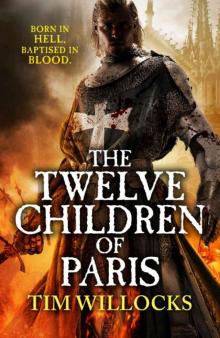 Tannhauser 02: The Twelve Children of Paris
Tannhauser 02: The Twelve Children of Paris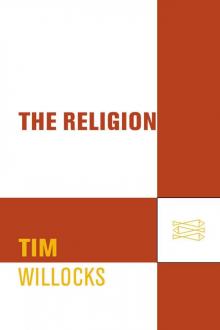 The Religion
The Religion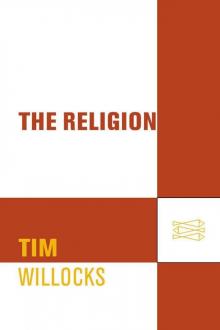 Tim Willocks
Tim Willocks Doglands
Doglands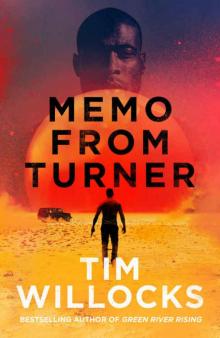 Memo From Turner
Memo From Turner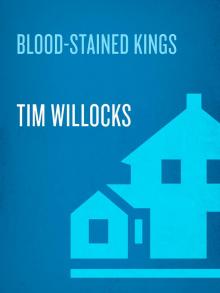 Bloodstained Kings
Bloodstained Kings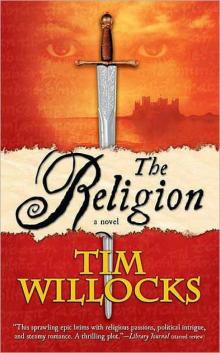 The Religion: A Novel
The Religion: A Novel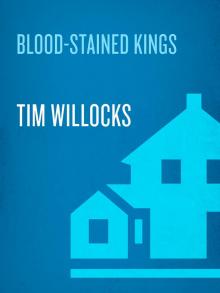 Blood-Stained Kings
Blood-Stained Kings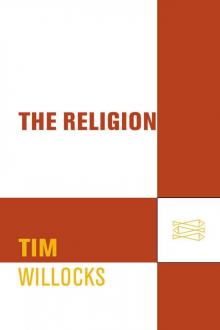 Religion: A Novel
Religion: A Novel